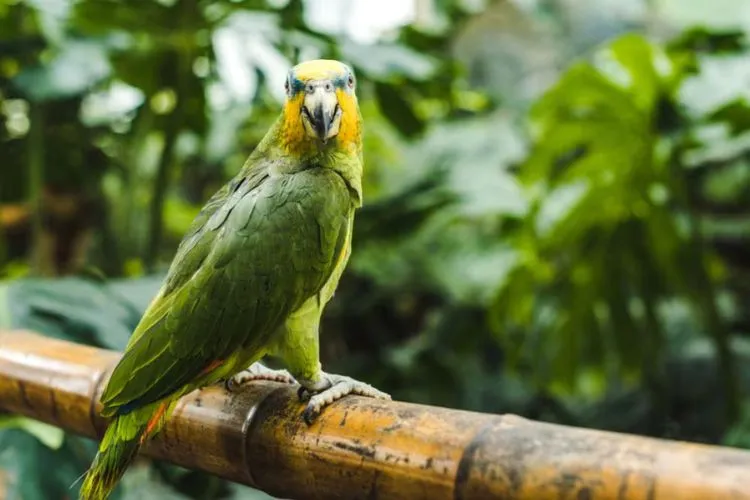Parrots, with their vibrant feathers, intelligence, and lively personalities, make truly delightful companions. As a responsible parrot owner, ensuring a well-balanced diet is key to keeping your feathered friend both happy and healthy.
One common question many bird enthusiasts ask is: can parrots eat asparagus? In this article, we’ll dive into the nutritional value of asparagus, whether it’s safe for parrots to consume, and how to incorporate it into their diet the right way.
Understanding what foods are beneficial—or potentially harmful—for parrots is essential to supporting their long-term health. Read on to discover how asparagus fits into a parrot’s menu and what other fresh foods are ideal for their daily nutrition.
Parrots, with their vibrant feathers and lively personalities, make delightful companions. As a parrot owner, you might wonder about the ideal foods to keep them happy and healthy.
Can parrots eat asparagus? Let’s dive into this topic and explore what’s best for your feathered friend’s diet.

🐾 Understanding Parrots’ Dietary Requirements
Parrots thrive on a varied diet. In the wild, they enjoy fruits, vegetables, nuts, and seeds. This variety provides them with necessary vitamins and minerals.
A good diet for a parrot includes a mix of fresh produce and high-quality pellets. It’s crucial to balance their meals to meet their nutritional needs.
🐾 Asparagus and Its Nutritional Profile
Asparagus is a green vegetable known for its unique flavor. It’s rich in vitamins A, C, E, K, and B6. It also contains fibers, proteins, and minerals such as iron, calcium, and magnesium.
This nutritional profile makes asparagus seem like a great choice for parrots. But is it suitable?
🐾 Can Parrots Eat Asparagus? Facts vs. Myths
There’s a lot of information, and not all of it is true. Some people believe asparagus can be harmful to parrots. Yet, no scientific evidence supports this.
With proper preparation, asparagus can be a part of your parrot’s diet. It’s vital to consider both the good and the bad.

Benefits of Asparagus for Parrots
Nutritional Boost
Asparagus offers a host of nutrients that contribute to a parrot’s health. It is packed with vitamins A, C, E, K, and B6. Vitamins A and E are known for their role in maintaining good vision and supporting healthy skin.
The Vitamin C in asparagus functions as an antioxidant, helping protect the body against damaging free radicals. Meanwhile, Vitamin K is essential for good bone health, and Vitamin B6 aids the body’s metabolism.
Improved Feather Quality
Feather health is a vital aspect of a parrot’s overall wellbeing. The high content of Vitamin A, C and E in asparagus promotes healthier feathers.
These vitamins aid in feather growth and development, and help maintain the vibrant colors that make parrots so captivating.
Immunity Support
Asparagus strengthens the immune system of parrots. It provides Vitamin C and other antioxidants, which are essential for boosting immunity.
These antioxidants help the body fight off illness and can contribute to overall health, longevity, and well-being of your parrot.
Digestive Health
Asparagus is high in fiber, which is beneficial for a parrot’s digestive system. Dietary fiber aids in promoting regular bowel movements and preventing constipation.
By including fiber-rich foods like asparagus in your parrot’s diet, you’re supporting their digestive health.
Potential Risks of Asparagus for Parrots
Gas and Diuretic Effects
While asparagus offers numerous benefits, it can cause gas or a diuretic effect in some parrots. Diuretics increase the amount of water and salt expelled from the body as urine, which can impact hydration levels.
If you notice that your parrot is urinating more than usual after eating asparagus, it may be best to reduce the amount they are consuming or eliminate it from their diet.
Possible Allergic Reactions
New foods can sometimes cause allergic reactions. Although not common, some parrots may not react well to asparagus. In rare cases, it might trigger allergic responses, resulting in digestive troubles.
Signs to watch out for include vomiting, diarrhea, loss of appetite, or other changes in behavior or physical health that seem out of character for your parrot.
Proper Introduction of New Foods
When introducing asparagus or any new food to your parrot’s diet, it’s essential to start slowly. Begin by offering a small amount and observe your parrot for any adverse reactions over the next 24 to 48 hours.
If no issues arise, you can incrementally increase the portion until it becomes a regular part of their diet.Remember: any changes in diet should be conducted safely and responsibly, with your parrot’s health as the top priority.
As with any specific dietary considerations, it’s best to consult with a vet or a bird nutrition expert before making significant changes to your parrot’s food intake.
🐾 How to Safely Introduce Asparagus to a Parrot’s Diet
First, choose fresh asparagus. Wash it thoroughly to remove pesticides. Steam it lightly to make it easier for your parrot to eat. Avoid seasoning or adding oil. Start small.

Offer a tiny piece and observe how your parrot reacts. If there are no adverse effects, you can slowly include more.
🐾 Frequently Asked Questions (FAQs)
While asparagus is generally safe, there’s a risk of gas or an upset stomach. Watch your parrot for any signs of discomfort.
Start with a small piece to see how your parrot reacts. You can gradually increase the amount if they enjoy it and don’t show any adverse reactions.
Wash it well and lightly steam it. Keep it plain, without any added flavors or oils.
As part of a varied diet, asparagus can be offered once or twice a week.
Watch for diarrhea, vomiting, or lessened appetite. If you notice these signs, stop feeding asparagus and consult a vet.
Conclusion:
Asparagus can be a healthy addition to a parrot’s diet. It offers essential nutrients that support their well-being. Yet, like with all foods, it should be given in moderation.
Watch for any signs of discomfort. When you introduce asparagus correctly, your parrot can enjoy its benefits safely.
